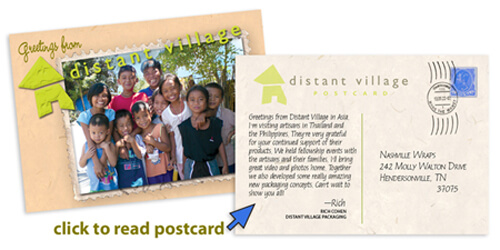
This morning in our Distant Village business I came across an interesting email inquiry, and thought the answers might be useful to other consumers seeking green solutions.
“I was wondering if anyone has done research on the GREEN benefits of FSC (Forest Stewardship Council) or PCW (Post Consumer Waste) papers and I wanted your opinion on the two. Which is better, or are the two equal in environmental benefits? What are some other alternatives?”
FSC and PCW – Apples and Oranges
The FSC standard is for wood products only. This type of standard is called a Chain of Custody Certification (CoC), and there are other standards which you may want to be aware of. All CoC standards are designed to provide assurance that forest products and their by-products originate from sustainably managed forests. SFI (The Sustainable Forest Initiative), FSC (Forest Stewardship Council) and PEFC (Program for the Endorsement of Forest Certification Programs) are industry standards.
Papers carrying any of these certifications might or might not have recycled content, but all their content could be traceable to sustainably managed forests. PCW (Post Consumer Waste) papers are made from recycled materials that might otherwise have ended up in a landfill. Both FSC and PCW papers are environmentally responsible. Paper made from trees in well-managed forests is a sustainable resource. Whether or not the paper is FSC certified, if it is from North America the forests are governed to a degree and are not like forests of countries in Asia and the southern hemisphere.
There’s more: Consider alternatives to wood-based papers when evaluating GREEN paper options.
Since Distant Village’s primary business is sustainable packaging, I am pleased to offer further insight. There are other green options, such as sustainable papers made from banana leaves, mulberry fiber, wild grasses, abaca and hyacinths. Non-wood papers can be more expensive but they are very eco-friendly. Their virgin materials are abundant, renewable, and sometimes even pesky plant species. For example, our company produces a paper from abundant, fast-growing and invasive tall wild Cogon grass (weeds). The grass is not wood-based, so it cannot be CoC certified at all. Expand your green view to include non-wood papers as well as tree-based papers.
Indeed, Tree-Free papers do not contain any wood or plant products, but are not necessarily green. For example, rock paper is made from limestone and HDPE (High-Density Polyethylene). It may be treeless, but depending on where it is made (like in China), it is not a good green choice and is probably not what you had in mind.
Tree-Free packaging made in the United States, however, is very sustainable, has a low carbon footprint and is green in most every sense of the word (except perhaps for the look and feel). Many people are prejudiced against plastics because they associate them with the Chinese-made t-sacks which have littered our land for years. Fortunately, that is getting better, as recycling is key with any packaging.
Consider adopting the Distant Village 3-tiered Sustainability Model: Support and promote environmental, social and economic well-being globally.
Thanks and keep asking!
Rich Cohen, Distant Village
with Robby Meadows,Nashville Wraps

